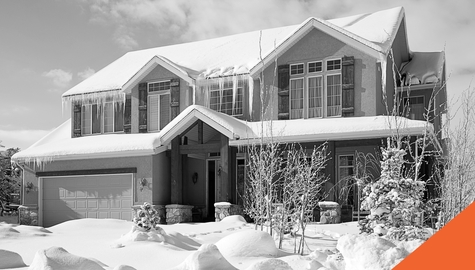How to Close your Cottage for Winter
Thursday, 12 October 2023
Fall is in full effect, and winter will be here before you know it. If you are a cottage owner, closing it up for the cold months might be an upcoming project for you. To help you avoid any unpleasant surprises in the spring, we’ve put together some tips on how to winterize your cottage so that you can prevent damage and not have to worry about filing a cottage insurance claim.
Checklist to winterize your cottage
Inspect the septic tank and sump pump.
The first step to winterize your cottage is to inspect the septic tank and sump pump. Septic tanks should be serviced every 5-8 years. Depending on usage, you may need to do this every 3-5 years. Book a professional inspection to ensure everything is working properly.
Remember to keep your sump pump running so your cottage does not flood once the snow melts. Consider investing in a generator as well. This will prevent the sump pump from shutting off in case a power outage occurs during the winter.
Drain the pipes and turn off the water.
By draining the pipes, you will help prevent your water system from freezing during the winter. Any exposed pipes that run outside or against an exterior wall can be wrapped in foam insulation to protect them from the elements.
You should then turn off the power to your water heater and the main valve. Follow this up by disconnecting the intake and draining the water from the heater. Then, open all the faucets in the cottage so that any remaining water is drained out of them. Once the pipes are empty, you can close all the taps and leave the power to the water heater off.
Clean the gutters and roof.
If your cottage is near a wooded area or has a lot of trees surrounding it, you will want to ensure you clean out your gutters once all of the leaves have fallen. This will allow melting snow and rain to flow easily into your gutters. Failing to do so can lead to water building up under your shingles, which can result in a leaky roof and having to report a claim to your cottage insurance provider.
Furthermore, snow that builds up on your cottage roof can lead to a leak or even cause it to cave in. Make sure your roof is free of any damage and isn’t missing any shingles before closing your cottage for the winter. You can also trim any overhanging branches that could potentially dump more snow on your roof while you are away.
Keep critters outside.
As a cottage owner, there is a good chance you will have company over every now and then. That said, if you are not diligent enough when you winterize your cottage, you could come back to find unwelcomed guests (i.e. animals) living in it. To keep the wildlife out, check the exterior of your cabin for any small holes where you think they can get into your cottage.
Cover your chimney and any openings you find, and board up the windows so that animals won’t eat through the screens to get in. This will also protect against the harsh winter weather and break-ins. You should also remove any garbage. If wildlife can get inside, there is a good chance they will rummage through it. Lastly, cover the mattresses and soft furniture and bring any linens or sheets home so critters do not take shelter inside them.
Unplug appliances and turn down the heat.
If you know you will be away from the cottage for an extended period, you should consider unplugging large appliances like your fridge, freezer, washing machine, and dryer. This will cut down on the energy you use and save you money in the long run.
The heat in your cottage can also be turned down. To prevent your pipes from freezing and/or bursting, it is recommended you set this no lower than 10 degrees Celsius. You can then turn off the gas before leaving your cottage for the winter.
Remove all food.
Clearing food out of your cottage during the winter is essential for several reasons. First and foremost, it is another preventative measure you can take against critters and animals that are looking for a food source. Additionally, cold temperatures can lead to food spoilage, rendering it unsafe to consume when you return in the spring.
To ensure a hassle-free and clean reopening when the warm weather returns, you can prop open the doors to your fridge and freezer so that air can flow through them and prevent mildew from building up. Leaving an opened box of baking soda inside will help soak up any odours that accumulate over winter.
Put any outdoor items into storage.
Consider disassembling patio furniture to save space and prevent structural stress. Use weatherproof covers or tarps to shield them from the elements and secure them with straps. Store outdoor cushions and fabrics indoors or in airtight containers. Clean, sharpen, and oil gardening tools and equipment before storing them to ensure they remain in good working order for the next season. Then, clean the barbeque and disconnect the propane tank before storing them in a safe location.
Regarding boats, kayaks, or canoes, it's essential to take extra care. Ensure they are thoroughly cleaned, including the removal of any algae or marine growth. Store them in a dry, sheltered area, if possible. If outdoor storage is your only option, invest in sturdy covers designed for watercraft and securely tie them down to prevent wind damage. Empty any gas remaining in any boat motors or equipment and bring the gas with you. If you can, disassemble your dock and store it safely as well.
Complete a final inspection.
A final inspection of the property is the last step you will need to complete. Double-check for and fix any damage you might have missed, lock all the doors and windows, lock up any items of value, and set the alarm if your cottage is equipped with one.
If possible, visiting the cottage to check on it throughout the winter is a good idea but not necessary. In some cases, there might be people who live in neighbouring cabins all year round. If so, let them know when you leave and ask them to keep an eye on the property. This is especially useful if you live hours away.
Once this is all done, your cottage should be set for the winter. As an added layer of protection, contact your BIG broker to review your policy so you can confirm you have the coverage you need for your cottage. Your broker will take the time to understand your situation and provide you with the best options to safeguard your home away from home.



